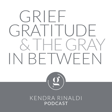
Meet Me Where I Am: Insights From the Film with Filmaker Grant Garry
Grant Garry is an award winning filmmaker, actor, and singer. He is the director of the documentary Meet Me Where I Am - now streaming on Amazon Prime Video and TUBI.
Grant recently starred as the “Beast” in Disney’s Beauty and the Beast at The San Luis Obispo Opera and as “Professor Callahan” in Legally Blonde: The Musical at the El Portal Theater in North Hollywood. Grant Graduated Cum Laude with a Bachelor’s Degree in Theatre Arts from Loyola Marymount University. He currently hosts The Where I Am Podcast available on Apple Podcasts, Spotify, and Amazon Music.
MEET ME WHERE I AM is the winner of The Audience Award for Best Documentary at Dances with Films. The film is now available on Prime Video, Apple TV, and a few other platforms.
Meet Me Where I Am features individual stories of love, loss, and hope. I was honored to sit down with some of the world’s most renowned grief experts, as well as artists, cultural figures, and everyday individuals to tackle this complex subject. The film features actor Anthony Rapp (Tony Award Winning "Best Musical" RENT, Star Trek: Discovery, Without You - New World Stages Hell’s Kitchen), acclaimed author and grief expert, David Kessler (author, Finding Meaning, ABC’s Good Morning America contributor), Ron Marasco Ph.D. (author, About Grief: Insights, Setbacks, Grace Notes, Taboos), Donna Schurmaan Ph.D. (Sr. Director of Advocacy & Training at The Dougy Center) and actor, brother of the late great comedian Chris Farley, John Farley, among others, to comprise a diverse roster of professionals who inspire us, through personal stories as well as researched-based insights, to move forward with our grief.
Watch MEET ME WHERE I AM (2024)
MEET ME WHERE I AM (2024) - Official Trailer
Contact Kendra Rinaldi to be a guest on the podcast https://www.griefgratitudeandthegrayinbetween.com/book-online


